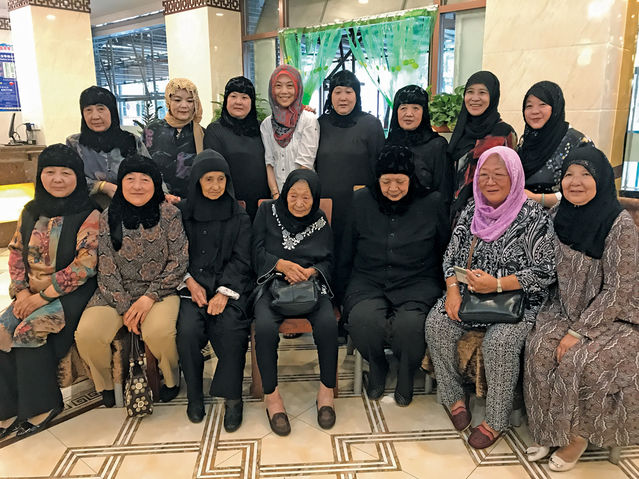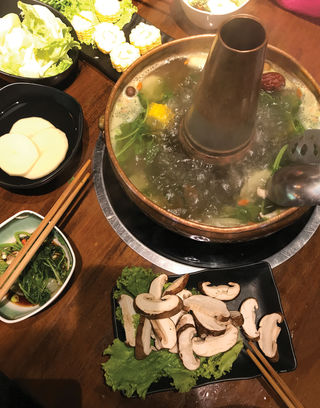Travels With 94-Year-Old Ahma
After a 68-year absence and visits with hundreds of cousins, two people mattered most.
By Lybi Ma published July 3, 2018 - last reviewed on September 4, 2018

After every phone call with our Mainland cousins, Mom hangs up and laments the size of the earth. China is so far away. Then she launches into memories about her family and village—she can just taste her aunt’s dumplings in hot soup. But, she says, it’s a past that’s gone and is pretty much forgotten.
My sister, who has traveled to China a few times, has shared her enthusiasm for visiting cousins with Mom. “Ahma, let’s go see them.” Mom had seen recent photographs of her hometown and remarked on how everything has changed. The mud-brick homes were razed to make way for high-rises, the language was not the same, even the food was different. (How did skinny jeans make their way to Xining?) Nope, she wasn’t going. She complained that setting foot in China was a silly idea, that she wouldn’t recognize anyone or anything there. Then there was her age. At 94, she often remarks that she’s just too old to go anywhere.
“Everything is a big bother.”
Was she making excuses? Or was she really saying that going back would be too painful for her? Everyone she knew was dead, or maybe she’d feel out of place and unsure.
It didn’t matter. It really is hard for her to get around. Plus, the Tibetan-Qinghai Plateau is at 7,500 feet elevation; I imagined my mother wearing an oxygen mask, carrying an air tank.
When I made a solo trip to the homeland decades ago, my father was all encouragement. He counseled me on protocol: I was to visit the eldest uncle on Dad’s side first; it’s simply not proper to visit Mom’s side first. Dad himself would not set foot on Mainland soil. The new republic had kicked him out—in fact, it set a bounty on his head. He was an intellectual and worked for the Kuomintang: two strikes. “Why would I crawl back to China?” he had asked. He died decades ago, but my mom had remained loyal to him, harboring his misgivings about a return to their homeland.
My family is Hui Muslim, and hundreds of Hui cousins are thriving in Xining, smack in the middle of China. It wasn’t always wonderful for them. They suffered in the Cultural Revolution; during spiritual fasting, for instance, Red Guards raided their homes and stuffed food into their mouths.
As far as history can remember, it was never easy for the Hui Chinese. The generations that came before my parents witnessed ethnic cleansing: Countless men and boys were beheaded and women appropriated like possessions—all by the Han Chinese, the ruling majority. My grandmother was a slave to a Han family, her mother a concubine to the village gunpowder maker, a Han. No wonder the Hui cling to their Hui-ness.
The Han Chinese are the world’s largest ethnic group. They make up 92 percent of China’s population; the remaining 8 percent comprise 56 other groups. The Hui are just one of them. In China, many of the ethnic groups traditionally didn’t, and still don’t, get along.
The Hui carry on.
My mother had always said, “We are Hui,” in a tone that’s high and mighty, as if she were leading us on a long march toward truth and justice. She makes me feel that we’re set apart from the rest of the Chinese, totally negating the Chinese in us. Our Hui-ness was most important.
When Communism came in 1949, my parents left their homeland. They spent hard years selling papayas on the side of Kowloon roads, until America opened up to Chinese intellectuals. We’ve had it easy here; we’ve had plenty of food, and the luxury of good educations. Still, it was hard, mostly for Mom; she had to watch us assimilate while she stuck to tradition. She even frowns when we alter a family recipe. “You’re changing history,” she insists, shaking her head.
The Hui may be Muslim, but they also harbor curious rituals that are decidedly Chinese. For instance, when I was small we had to meticulously clean the house in preparation for Friday. But on this Muslim holy day, we lit incense and welcomed all our dead ancestors into the home. If Mom caught any of us singing in the shower, she knocked on the bathroom door and shouted that we were chasing the ancestors away. The house had to be tomb-quiet. Then Mom sat alone in her room for hours—in truth, I think she just had had enough of us kids and needed some peace and silence.
Last spring, by phone from California, my sister was giving me tips on the tricky business of handling eggplant. Suddenly she piped, “Ahma wants to go to China.”
Ha ha ha, that’s a funny joke. I wanted to shout at my sister: “What if Ahma got sick in China? What about the elevation?” I prayed my sister would get a clue. Besides, Mom can’t go anywhere if we don’t take her.
Two weeks later, my sister announced: “The consulate wants Ahma’s birth certificate. Heck, she ran out of China with her apron on.”
Suddenly, I felt really tired, as if I knew I had to climb 10 steep mountains. My sister is in her 70s and not in fighting form; both she and Mom would need help. My brothers were not able: One was on the go for business; the other was nursing a sick wife. I guess I was going back to China, this time with Ahma and my sister. It seemed physically impossible. Emotionally, it seemed even more impossible.
Yet a few months later I was on a plane to China, hopeful that it wouldn’t be so bad.
On our first night in Xian, at 2 a.m., the three of us sat awake in our spacious hotel room with no need for sleep. We were so awake we were chewing on dumplings from the open market. Eating in the middle of the night is no way to manage jet lag, but we didn’t care. We stayed up to laugh and gossip like schoolgirls. “Did you know that so and so’s brother is dating a girl 20 years his junior?” “You’re kidding?” I don’t remember all we giggled about, but everything seemed funny; I think we were just happy to be together.
What had I fretted over? My sister was right. Everything would be fine.
When the cousins descended, they packed us into a van for a day’s drive to the hometown, past green pastures and terraced hillsides.

Hundreds of cousins wanted to see this 94-year-old auntie from America. Each family wanted to put on a 10-course banquet for us; we sampled dumplings, noodles, fried bread, braised duck, steamed fish, moon cakes, and on and on. Every day another cousin and more family presented their lovingly prepared dishes.
We three were careful not to overdo it, but I still worried that Mom would fall over with a cold or fever. Yet it was my sister who got sick—from the altitude. My cousins came to the rescue with oxygen and herbs and pots of tea. The cousins and I hovered over my sister and Mom, applying oxygen and good cheer. My sister recovered in two days.
The invitations resumed. Following a particularly boisterous day of cousins and dumplings, I found my mother sprawled on the floor in a cousin’s home, taking shallow breaths. After that, I stayed next to her and took on a hypervigilance that stretched through night and day; I was the little prairie dog that poked its head up to sniff at the slightest sound. What was that noise? Who is awake at this hour? I wonder whether Mom needs water?
Altitude sickness makes a person punch drunk. My mother, who seemed to recognize only me and my sister, kept asking each cousin: “Who are you?” She repeatedly said to the cousin whose house we were staying in: “Aren’t you going home yet?”
A local doctor paid us a house visit and announced that Mom would be fine to travel after a few days of rest; she just needed round-the-clock oxygen until we left. My cousins will not admit this, but after the weeks-long visit they had to be happy to see us go. “Auntie better not die on us,” one cousin kept saying to me in the middle of Mom’s illness.
I safely delivered my mother and sister home to California and Mom was still alive—although I kept dreaming that we were still stuck in China.
I could have said to my sister, “I told you so.” But, truthfully, I’m grateful that she had the determination to see Mom in China; it was, after all, one big goal that she just had to accomplish. Sure, it could have been worse: Mom could have ended up in the hospital. But she didn’t. Seeing Mom return to her home, greeted by hundreds of people who look just like us, was priceless.
Afterward, we asked Mom about her highlights of the trip. “It was nice to see cousins,” she said nonchalantly. “But my most valuable experience? Spending time with my two daughters.”
